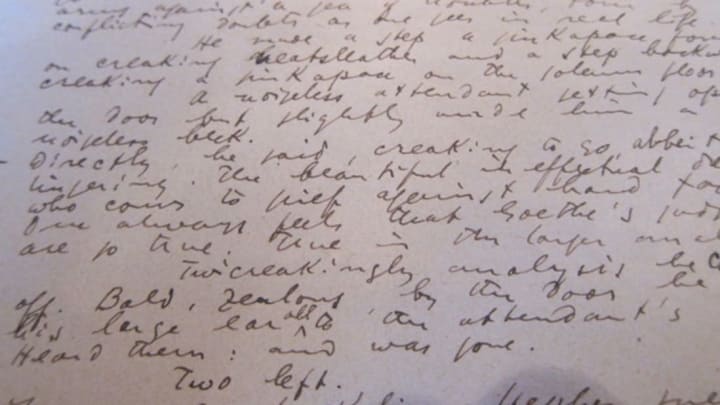Kathy Haas, Associate Curator of the Rosenbach Museum and Library, calls Bloomsday "the only international literary holiday." The celebration of James Joyce and his novel Ulysses makes a strong case for that distinction, but that doesn't mean there aren't pockets of particular enthusiasm on June 16: Dublin, of course, and—perhaps less obviously—Philadelphia.
The City of Brotherly Love's claim to the famous work resides in a classic brick townhouse on Delancey Street. There, the Rosenbach houses the art and book collections of Dr. A.S.W. Rosenbach and his brother Philip. A highlight of the literary treasure trove is the only complete, hand-written manuscript of Ulysses. Well, nearly complete. The final sentence is missing—Joyce claimed to have lost it—and when it was found after his death it ended up at the University of Buffalo.
The manuscript began as Joyce's "fair copy." The author either couldn't or wouldn't type his work, and so his messy notebooks had to be rewritten by Joyce himself in (marginally) neater script to be sent to the typist. In 1917, Joyce began the project of transcribing his work, often using it as a chance to edit as he went. Two years later, John Quinn, an Irish-American collector of literary manuscripts, offered to buy the fair copy from Joyce to be auctioned off. The author sent what he had, but the novel itself was not yet finished. Over the next year, Joyce finished writing, but because the book was still in process, these later sections are much rougher, with scrawled edits and bearing less of a resemblance to the final product we know today.

This unique provenance makes it slightly tricky to categorize the artifact. "It’s a complicated story because each section of the manuscript has a different relationship to the final text," Haas says. "He did continue to make changes—for example, our manuscript is significantly shorter than the final novel."

Caveats aside, it's a rich piece of literary history. Researchers are invited to contact the Rosenbach's librarian for access to the manuscript and it has provided dozens of years of distinct exhibits tied to Bloomsday. This year, in conjunction with Shakespeare's 450th birthday, the exhibit examines the effect of the Bard's work on Ulysses. Even ignoring references or allusions, the novel quotes directly from over 30 plays—everything from Antony and Cleopatra to Twelfth Night. Visitors can see the original pages of the manuscript that include those quotes alongside 17th century folios of Shakespeare's plays.

The Bloomsday Festival runs until Wednesday this week, but the exhibit—along with a separate case comparing Ulysses to Dubliners, which turns 100 this year—will be up all summer. Oh, and each year the museum designs a new Bloomsday shirt, which are all pretty great.

